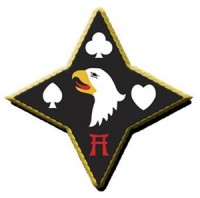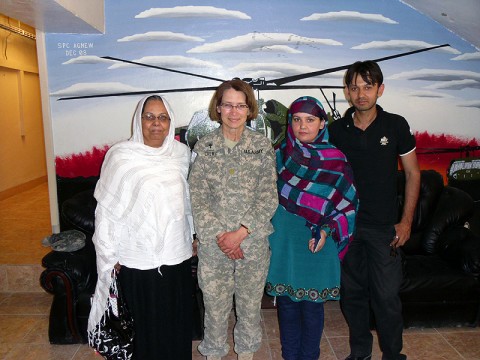Written by Spc. Michael Vanpool
101st Sustainment Brigade, 101st Airborne Division (AA) Public Affairs


Bagram Airfield, Afghanistan – From a chance encounter at a Baptist church in Georgia, Maj. Tammie Crews was able to build relationships across the world in Afghanistan.
The chaplain for the 101st Sustainment Brigade, “Task Force Lifeliner,” met with a local mother and daughter working to progress women’s rights in Afghanistan and to give them several donated needs for girls here.
Crews met Mashuq Askerzada at a church near Fort Benning, GA. Askerzada was born in Afghanistan and left for the United States decades ago. They built a friendship that lasted after Crews left the area. When Crews joined the Lifeliners to deploy to Afghanistan, Askerzada put her in contact with his sister still in Afghanistan.

Najiba has risen to an active role in politics by running for office in Kabul and Kunduz. Her daughter, Geety, has worked to women’s rights in her own way by working her way up to become a school principal in Kabul.
“Being a school teacher, she’s really trying to educate girls,” Crews said. “[Najiba] is working in the political system. They’re really at the forefront of women’s issues and giving women a voice in the society.”
The women and Crews talked for months through emails trying to arrange a meeting. All through these months of talking, Crews gathered donations from several sources for the girls of Geety’s school.
Chapels at Fort Campbell sent children’s hygiene kits that were built during the summer vacation bible schools. Crews also set aside schools supplies sent in the plethora of care packages she distributes to soldiers here.
School supplies were also sent from Jason’s Box, a non-profit organization that sends care packages to deployed soldiers. When the brigade was approached by Jason’s Box this past spring, the Lifeliners asked the organization to instead send school supplies for the chaplain’s mission with the women here.
Clothes, blankets and infant supplies were also donated by Operation Care and Comfort from San Jose, CA, Lindon Police Department wives from Lindon, Utah, and Adopt-A-Platoon.
During the Muslim Holy Month of Ramadan, Crews, Najiba and Geety met up at the brigade headquarters here. They spent an afternoon sitting around talking and sharing stories. Najiba was especially eager to know what her brother’s three children looked like, since she has never met her nephews and niece.
When the time came for the women to part ways, Crews gave her visitors the nearly 60 boxes of donations. They used these donations to help the young schoolgirls, who often go without the most basic of needs.
The timing of the meeting and donations had a special meaning for the women. Ramadan is a time of fasting and helping the less fortunate.
“Even though we didn’t plan it, it’s a season of giving near the end of Ramadan, much like the Christmas season,” Crews said. “It was a symbol of giving to them from the American Army to those that are in need.”


